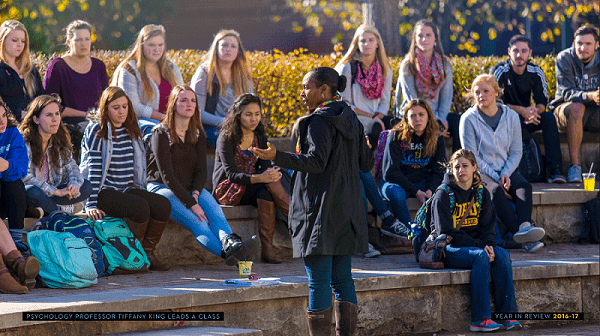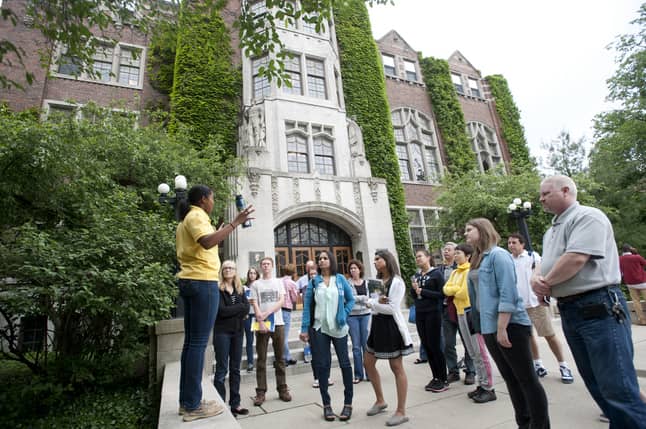How to Make Your Final College Decision
When it comes to choosing the best college to attend, many high school students risk making a decision that is not in their best interest. Even if they toured and applied to a school that seemed like a good fit for them, they might feel pressured to go with a different school simply because it has a better reputation.
But just because a school is labeled among the “best,” does that really mean that it’s the best for everyone? Of course not! For example, not every student wants to go to school in a big city, nor does every student want the same major, concentration, or facilities. Any number of factors play into what makes a fulfilling college experience, and the perfect combination of those factors will vary between everyone. And once you realize that most of the statistics that calculate college rankings have nothing to do with the actual day-to-day life of students, you know it’s time to rethink your final decision.
Jeanine Mozie, Vice President for Student Enrollment and Retention at Trinity Christian College offers her expert insight on how you can find your perfect college fit. Choosing the right one will help you succeed in your education and career preparation, and it will likely be a more exciting and fulfilling time in your life. This guide outlines several key steps to take as you consider what will be the best college for you.
- Consider A College’s Location
One factor you should always consider when choosing a college is the location. Do you want to commute to school or live there? Both options work well for students, but you likely have a preference.
As you think about this, you can search for great colleges by state, as this provides a way to find colleges in the state you prefer.
One important thing to note is that you shouldn’t choose a college only by its location. The location is just one of many vital factors to consider as you narrow down your options
- Evaluate Your Scholarship Offers And Costs
As you work toward your final decision, you may want to evaluate the costs of your potential colleges. You can begin by considering any scholarships you might have access to for your undergraduate studies. Some scholarships allow you to fund your education at any school, while others might be for a specific university.
You can also compare the costs of schools by looking up the tuition amounts. Keep in mind that if you live at college in a dorm or apartment, you’ll have extra costs on top of the tuition.
It might be helpful to consider how you’ll pay for your schooling. Do you have enough money in the bank to pay cash for it, or will you take out student loans? You need a plan for this before selecting a school.
- Research The Curriculum And Programs
The next step is to consider is the curriculum and selection of programs a college offers. If you have an idea of what you want to major in, you can start narrowing down your options based on which school does or does not offer what you’re looking for.
Start researching the programs offered at various schools to find some that have your desired major. Browse through the major’s department to see the different opportunities, formats, and requirements that come with your field of study.
Keep in mind that different schools can take different approaches for the same field of study, so don’t expect the same major to be the same all across the country. For example, Trinity Christian College in Palos Heights, Illinois, is introducing an innovative curriculum in fall of 2022 that is transforming the traditional five-day-a-week class schedule, with Wednesdays open for internships, field experiences, academic support, and more. Not every school will make room in students’ schedules to prioritize hands-on experiences like these!
As Jeanine Mozie, Vice President for Student Enrollment and Retention, explains, Trinity’s classes will shift from a five-day Monday-Wednesday-Friday and Tuesday-Thursday cycle, to a four-day, Monday-Thursday and Tuesday-Friday schedule. “This shift in classes will open up Wednesdays to students for a wide range of engagement and opportunity that can be customized to meet each student’s needs, interests, and schedule,” said Mozie.
The new schedule will not just allow students to achieve greater success in their academics and vocational preparation, though. It will also allow them to focus on their mental and emotional health, which are vitally important. “Our students are overwhelmingly excited about the possibilities!” said Mozie.
- Look at Community Life
Picking the right college also requires choosing one that has a community in which you can thrive.
Community life includes the programs and opportunities that students have to do things outside of class with others.
Finding a college with a good community life can help you in many ways, allowing you to:
– Build strong connections
– Make lots of great memories
– Serve others
– Have fun
– Create experiences
– Try new things
– Develop new skills
– Improve your self-confidence
College offers a way to earn a degree for a great career, but it also provides opportunities for self-growth and memorable experiences.
- Find a School With an Outstanding Environment
Before you choose a college, you should also consider the learning environment. Atmosphere is everything, so evaluate how the following function at your potential school:
Staff
Are the professors engaging? Do they truly care about the students? You can meet staff by visiting the school, or you can read about them online.
Student Housing
What is student housing like at the college? Do they offer various meal plan options? Are the dorms spacious and clean?
Many colleges require dorm living for first-year students. If this is the case, you’ll want to thoroughly evaluate the dorms before enrolling.
Sports
If you want to play a sport in college, you may want to factor this into your decision, too. Some colleges offer many sports, while others offer none.
If this is a big part of your decision, you may want to find out more about player selection before basing your decision on a particular school.
- Visit Schools Before Choosing
One of the best things you can do to make your final decision is to visit the schools themselves. You can visit one or many, but you should always see a college in person before choosing it.
Here are a few tips to help you get the most out of these visits:
Don’t Rush
First, make sure you plan your visits when you have time to spend at the colleges. In other words, don’t rush through the visits. Instead, take your time and enjoy viewing the colleges.
Take Notes and Pictures
Next, you might want to take notes and pictures while you’re there. You’ll remember each school by doing this, and you’ll have something to compare when you make your decision.
Explore the Community
Finally, take some time to explore the community. While you’ll spend most of your time at the college campus, you’ll also get opportunities to spend in the community.
As you approach your college decision day, you want to feel confident that you picked the right school. Following these tips can help you know that you made the right choice!
- Choose From The List Of Colleges Of Distinction
Choosing the college you’ll attend is a big deal, and it’s not something to take lightly. However, instead of searching for what people say is the “best” college, you should take your time to find the “right” one for you!
As you begin your search, check out our list of schools to see which ones we have vetted for overall quality. Our Colleges of Distinction are unique—not every school is for every student, but they all excel in what they offer!










